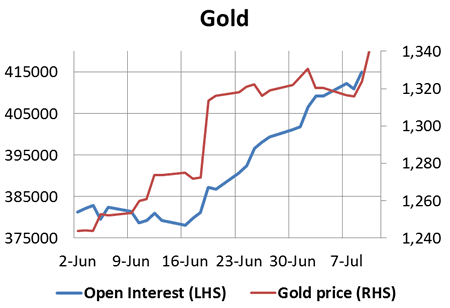Being A Star In Your Industry Is A Matter Of Gold Prices
 The foundations changed after Greece and other southern European international locations acquired into severe hassle, sending bond yields (nominal interest charges) via the roof. The central banks of member nations should not have the power to bail out their governments or their failing local banks as the Fed did for U.S. EU member governments have misplaced the sovereign power to difficulty their very own money or borrow money issued by their very own central banks. 2008 financial disaster. Before the Eurozone debt disaster of 2011-12, even the European Central Bank was forbidden to buy sovereign debt. Since EU banks now should pay the ECB to hold their bank reserves, they may as well hold adverse-yielding sovereign debt, which they may be able to sell at a profit if charges drop even further. These platforms are extremely stable, أسعار الذهب اليوم even supposing the concrete base is not even connected to the seafloor. Despite the extra weight and the lack of Super Duty energy, the brand new GP was a runaway success.
The foundations changed after Greece and other southern European international locations acquired into severe hassle, sending bond yields (nominal interest charges) via the roof. The central banks of member nations should not have the power to bail out their governments or their failing local banks as the Fed did for U.S. EU member governments have misplaced the sovereign power to difficulty their very own money or borrow money issued by their very own central banks. 2008 financial disaster. Before the Eurozone debt disaster of 2011-12, even the European Central Bank was forbidden to buy sovereign debt. Since EU banks now should pay the ECB to hold their bank reserves, they may as well hold adverse-yielding sovereign debt, which they may be able to sell at a profit if charges drop even further. These platforms are extremely stable, أسعار الذهب اليوم even supposing the concrete base is not even connected to the seafloor. Despite the extra weight and the lack of Super Duty energy, the brand new GP was a runaway success.
Despite soaring gold price now prices, Peter Schiff believes buyers are distracted by Bitcoin, missing key warnings about inflation. In actual fact, the Bank of Japan cannot get the country's inflation rate even to its modest 2 % goal. Meanwhile, the bail-in scheme that was supposed to shift financial institution losses from governments to bank creditors and depositors served as an alternative to scare off depositors and buyers, making shaky banks even shakier. Rather than flirt with another bail-in disaster, Italy was prepared both to flaunt EU guidelines or depart the Union. But default or debt restructuring was not thought-about an option; and in 2016, new EU guidelines required a "bail in" before a authorities might bail out its failing banks. The ECB finally obtained on the quantitative easing bandwagon and started shopping for authorities debt along with other financial property. Assuming the big-scale asset purchases made at some future date have been of federal securities, the federal authorities would be financing its debt nearly interest-free, for the reason that Fed returns its earnings to the Treasury after deducting its prices. The Bank of Japan now holds almost half of Japan's federal debt, a radical transfer that has not triggered hyperinflation as monetarist economists direly predicted.

In an article appropriately titled, "Dead Money" (11/01/12), The Economist reviews how main companies trim real investment--resembling new know-how--while piling up money. As we saw in Central America, battle additionally played a significant function in the emergence of narco states along the African coast. This is what Japan's banking law requires, and it has been very successful underneath Prime Minister Shinzo Abe and "Abenomics." It is usually what a crew of former central bankers led by Philipp Hildebrand proposed along with final month's Jackson Hole meeting of central bankers, after acknowledging the central bankers' traditional tools weren't working. Under their proposal, central bank technocrats would be answerable for allocating the funds, but better could be the Japanese mannequin, which leaves the federal government in control of allocating fiscal policy funds. But when Trump cannot get Powell to agree over lunch to these arrangements, Congress could amend the Federal Reserve Act to require the Fed to work with Congress to coordinate fiscal and financial policy. Perhaps in tacit acknowledgment of those problems, Fed Chairman Jay Powell responded to a question about adverse interest rates on Sept.
Should you loved this informative article and you wish to receive details concerning أسعار الذهب في الكويت assure visit the internet site.
